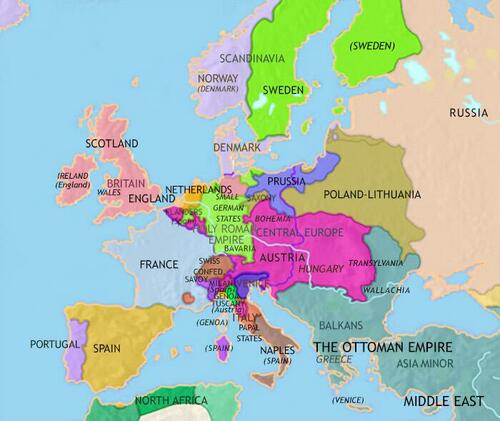No Country Has A "Right to Exist"
By Brian McGlinchey via starkrealities.substack.com
In the weeks since 2,500 Hamas militants went on a murder and kidnapping rampage in southern Israel, a wave of pro-Palestinian demonstrations has erupted across the United States and around the world. These displays have only grown in size and number as Israel’s military responds by punishing the entire, densely-packed population of Gaza with a blockade on food, water and medicine, a devastating bombing campaign and now a ground invasion.
While no mass protest is free of people with bigotry and amoral stances, proponents of Israel have been far too quick to accuse pro-Palestinian protesters of antisemitism. One of the most common of such false accusations rests on a false premise — namely, that it’s inherently antisemitic or genocidal to question Israel’s “right to exist.”
That premise is false for a number of reasons, the most salient of which is this: No country has a “right to exist.”
After all, what is a country — or, in more precise terminology, a state — other than a political arrangement? And why would any political arrangement be deemed as having “rights,” much less a supposed right to never be altered or cancelled?
While definitions vary, Murray Rothbard best distilled the state in his classic long essay, “Anatomy of the State.” Rothbard wrote: “The state is that organization in society which attempts to maintain a monopoly of the use of force and violence in a given territorial area.”
Whether the associated flag of the state in question has a Star of David, stars and stripes, or a hammer and sickle, the suggestion that it’s immoral to propose that such a monopoly be rearranged or replaced is preposterous on its face. Over the broad sweep of history, the norm is not states existing in perpetuity. Rather, history is the story of never-ending rearrangements of these many monopolies on the use of force and violence.

Did the Soviet Union have a “right to exist”? What about Yugoslavia, Czechoslovakia or the Ottoman Empire? Are we all culpably-silent bystanders to some kind of ongoing injustice as long as those bygone states are not reconstituted?
Rather than having a right to exist, each state — from Israel to Ukraine to the United States — must have permission to exist. As expressed in the Declaration of Independence, “Governments are instituted among men, deriving their just powers from the consent of the governed.”
To embrace that fundamental principle is to acknowledge that the State of Israel — a political entity — can only justly continue imposing its monopoly on the use of force and violence if it has the consent of those it governs.
And who does Israel govern? For all the talk of a two-state solution, and maps depicting the West Bank and Gaza as something somehow separate, the fact is that the State of Israel rules everything “between the river and the sea,” to invoke a contentious phrase we’ll revisit shortly.
“Between the Mediterranean Sea and the Jordan River, one state controls the entry and exit of people and goods, oversees security, and has the capacity to impose its decisions, laws, and policies on millions of people without their consent,” wrote Michael Barnett, Nathan Brown, Marc Lynch and Shibley Telhami in Foreign Affairs. Their April essay presciently warned that “a storm is gathering in Israel and Palestine that demands an urgent response.”
The population across that Israel-ruled territory includes 7.5 million Jews and 7.5 Arab Israelis and Palestinians, with each group subject to different treatment.

West Bank Palestinians endure restrictions on their movements, from checkpoints to segregated highways. The State of Israel frequently demolishes Palestinian homes and businesses for lack of permits that are extraordinarily difficult to secure. Palestinians endure ongoing harassment and under-reported acts of vandalism, agricultural destruction and violence perpetrated by settlers who operate under the protection of the Israel Defense Forces (IDF).
In neighborhoods such as East Jerusalem’s Sheikh Jarrah, Palestinians are frequently evicted from their homes under a complex law that perversely declares them to be “absentees” even if they’ve lived in their house for decades. In one infamous video of such an eviction, an obese Jewish settler tells a distraught Palestinian homeowner, “If I don’t steal it, someone else is gonna steal it.”
Meanwhile, Gaza is rightly labelled “the world’s largest open-air prison.” Though Israel withdrew forces and settlers from the 25-mile long strip in 2005, it’s continued to control the territory from the outside, in a way that creates a miserable existence for 2 million inhabitants in one of the world’s most dense population centers.
Controlling Gaza’s air, sea and land borders, the State of Israel imposes an ongoing, economic blockade that fluctuates in intensity. Individuals are only granted travel permits under narrow circumstances. Israel does not allow Gaza to operate an airport or seaport, and imports and exports via road are tightly restricted. Egypt has compounded the situation with its own restrictions and periodic border closures.
The result is economic devastation: The pre-Oct 7 unemployment rate was over 46%, per capita income only about 25% of the West Bank’s level, and 65% of Gaza residents were below the poverty line.
Given the reality of life for Palestinians in this de facto single state that includes Gaza and the West Bank, it’s understandable that many would call for an entirely new system of government between the river and the sea. As the Declaration of Independence asserts, when “any form of government becomes destructive” of the rights of life, liberty and the pursuit of happiness, “it is the right of the people to alter or abolish it, and to institute new government.”
Intentionally using inflammatory language, Israel’s defenders often say that those who call for a new government are advocating the “destruction” of Israel.
“Dissolution” would be more precise when discussing a government, but “destruction” serves their public relations goal of demonizing the opposition by connoting they’re bent on physical destruction.
Israel supporters employ similarly flawed characterizations of an often-used Palestinian slogan that’s ubiquitous in the ongoing protests: “From the river to the sea, Palestine will be free.” It’s reasonable to interpret that as a call for the dissolution of the State of Israel, but those pushing back against pro-Palestinian voices regularly declare the slogan is nothing less than a call for genocide.
While any slogan will mean different things to different people, this one has been used for decades by Palestinians seeking the same liberties as Israeli Jews throughout the entire territory ruled by the State of Israel.
“From the river to the sea, Palestine will be free” – a call for Israel’s destruction – was chanted by thousands at a demonstration in Amsterdam today. https://t.co/fDShR0EvnG
— ADL (@ADL) October 15, 2023
Chief among their wishes is for the freedom of Palestinian refugees in Lebanon, Jordan, the West Bank and Gaza to return to what is now considered Israel proper. Some 700,000 Palestinians were either expelled or forced to flee that land when the State of Israel was instituted in 1948.
Any intellectually honest appraisal of the situation in Israel must center on an acknowledgement that the two-state solution’s ship sailed long ago, thanks to relentless Jewish settlement of the West Bank having eliminated any possibility of a contiguous Palestinian state.
Given the facts on the ground, a growing number of advocates inside and outside greater Israel are calling for a different one-state arrangement — one with a secular government securing equal rights for all it serves.
Belying assertions that calling for the State of Israel to be replaced is antisemitic, those advocates include many Jews.
To take one prominent example, abandoning his long-running defense of Israel, prominent American Jewish intellectual Peter Beinart embraced the idea in a milestone 2020 New York Times essay, “I No Longer Believe in a Jewish State.”
Thanks to a cultivated mythology that falsely depicts Arab-Jew conflict as something intrinsic and eternal rather than something that largely bloomed in the 20th century, many Westerners can’t conceive of Jews and Muslims living peacefully in the same country.
However, that was the condition in Palestine before the creation of the State of Israel — and it’s even the condition today in the Zionist state’s archenemy, Iran. There, the Middle East’s largest Jewish minority operates synagogues, enjoys kosher restaurants, runs hospitals and schools, and even has a reserved seat in the Iranian parliament.
Western Governments Weaponize False Premises to Limit Speech
It would be bad enough if references to a nonexistent “right to exist” and false accusations of genocidal intent were only used as intellectually bankrupt talking points. However, in a variety of countries, these falsehoods are alarmingly being hard-wired into government policies and used to curtail speech and the exchange of ideas.
In Switzerland, police this month banned a planned protest simply because promotional messaging included “from the river to the sea, Palestine will be free,” which authorities declared an incitement to violence.
Berlin police went further, declaring it illegal to speak the slogan and already arresting at least one man for doing so.
Europe has long held the lead in the West’s race to authoritarian dystopia, but politicians like 2024 Republican presidential candidate Nikki Haley are doing their best to help the United States catch up.
Haley recently promised to “change the official federal definition of antisemitism to include denying Israel’s right to exist,” and to use that warped definition to cancel the federal tax exemption of any college that allows students or professors to freely argue for a different political order in what is now greater Israel.
Those who support the State of Israel are free to present a case that it’s a just arrangement for the 7.5 million Jews and 7.5 million Palestinians “between the river and the sea.” However, painting those who demand a new arrangement as inherently immoral, genocidal or antisemitic is ignorant at best and maliciously misleading at worst.
* * *
Stark Realities undermines official narratives, demolishes conventional wisdom and exposes fundamental myths across the political spectrum. Read more and subscribe at starkrealities.substack.com
https://ift.tt/joy1Qq7
from ZeroHedge News https://ift.tt/joy1Qq7
via IFTTT





0 comments
Post a Comment